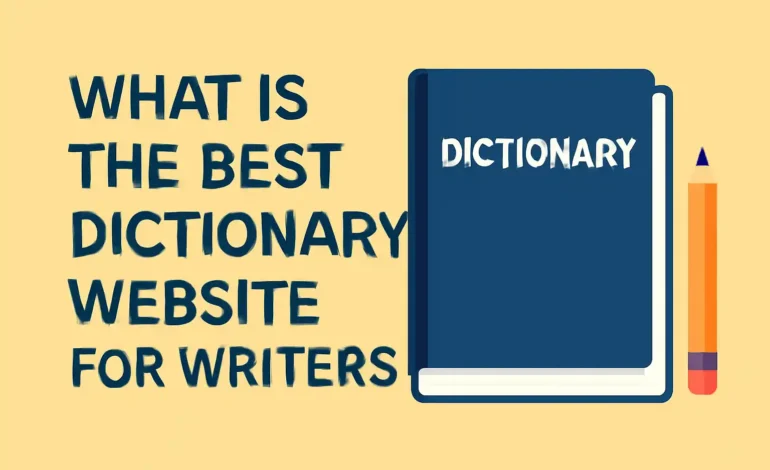What is the Best Dictionary Website for Writers?

Introduction
As a writer, whether you’re crafting a novel, working on academic research, or writing a blog post, having access to the right tools is essential. One of the most important tools a writer can have is a reliable dictionary. A good dictionary not only helps with finding accurate definitions but also enhances the quality of your writing by providing synonyms, usage examples, and even pronunciation guides.
The question often arises: What is the best dictionary website for writers? With so many options available online, it can be overwhelming to choose the right one. Writers need more than just basic definitions; they need comprehensive resources that can expand their vocabulary, improve their writing style, and ensure that they are using words correctly. In this article, we will explore some of the best online dictionaries for writers, including those that cater specifically to academic writers and editors.
Why Writers Need a Good Dictionary
For any writer, a dictionary is more than just a tool for finding definitions; it’s a powerful resource that can help elevate their writing. Here’s why writers, whether they are working on creative pieces or academic papers, should always have access to a good dictionary:
Expanding Vocabulary
A well-rounded vocabulary is essential for clear, effective writing. By using a dictionary regularly, writers can discover new words and phrases, enhancing their ability to express themselves precisely and creatively. A good dictionary will often provide synonyms and related terms, helping writers avoid repetition and diversify their language.
Ensuring Precision
Writers need to be precise in their choice of words. Using a word incorrectly, even unintentionally, can change the meaning of a sentence and confuse readers. A dictionary ensures that every word is used with its correct meaning and context. This is especially important for academic writers, where clarity and accuracy are crucial.
Improving Grammar and Style
Beyond definitions, many dictionary websites offer valuable insights into grammar and usage. They often include examples of how words are used in different contexts, which is especially useful for writers working on essays, articles, or novels. Style tips and usage guides can help writers refine their tone, ensuring that their writing is professional and polished.
Access to Specialized Terms
For academic writers, the need for specialized terminology is common. Many online dictionaries, including those geared toward academic use, provide definitions for technical terms and jargon. Writers can rely on these dictionaries to ensure they understand complex concepts in their field and use them correctly.
Overall, a good dictionary is a writer’s best friend, supporting their goal of communicating clearly, effectively, and with confidence.
Top Online Dictionaries for Writers
When it comes to choosing an online dictionary, there are several options that stand out for their depth, accuracy, and ease of use. Whether you are a creative writer, an academic author, or a professional editor, these online dictionaries can provide the support you need to enhance your writing.
New Oxford Dictionary for Writers and Editors
The New Oxford Dictionary for Writers and Editors is often considered the gold standard for writers, especially for those working in professional and academic contexts. This dictionary is specifically designed for writers, editors, and journalists, offering not only definitions but also valuable advice on usage, spelling, and punctuation. It includes a comprehensive guide to the correct usage of words and helps with understanding complex grammar rules.
What sets it apart is its focus on editorial style, making it a must-have for anyone who needs a reliable reference for writing and editing. It’s particularly helpful for those working on academic papers or formal documents.
Merriam-Webster
For everyday use, Merriam-Webster is one of the most popular online dictionaries, and for good reason. Known for its clear definitions and user-friendly interface, Merriam-Webster is an excellent tool for all types of writers. It provides not only definitions but also example sentences, synonyms, and related words. One of its standout features is the thesaurus, which makes it easier for writers to find the perfect word.
Collins English Dictionary
The Collins English Dictionary is another trusted resource for both British and American English. It is particularly helpful for writers looking for modern, up-to-date language. Collins also provides synonyms and definitions in context, making it an excellent choice for writers looking to improve their style and readability. Whether you’re writing for an international audience or focusing on specific regional dialects, Collins offers valuable resources.
Cambridge English Dictionary
The Cambridge English Dictionary is another great tool for writers, particularly those learning English or those who prefer simple, clear definitions. This dictionary is known for its accessible language and its ability to break down complex words and phrases into easily understandable explanations. It also provides pronunciation guides and example sentences, helping writers use words in the right context.
Features of the Best Dictionary Websites for Writers
Not all online dictionaries are created equal. When choosing the best dictionary website for writers, it’s important to look beyond just definitions and consider additional features that can enhance your writing experience. Here are some key features that make the best dictionary websites for writers stand out:
User-Friendly Interface
A good dictionary should be easy to navigate. Writers need to access information quickly without getting bogged down by a complicated layout. The best online dictionaries for writers offer clean, simple interfaces that make searching for words and exploring related terms a breeze. Whether you’re looking for a definition, example sentence, or synonym, the process should feel seamless and efficient.
Comprehensive Word Search Features
The best dictionary websites offer powerful search features. Writers often need to find not just the definition of a word, but also related terms, synonyms, and antonyms. A dictionary that includes search functions like wildcard searches or suggestions for misspelled words can save time and increase efficiency. It’s particularly useful for writers who work with a broad vocabulary or frequently encounter new or technical terms.
Contextual Examples
Understanding how to use a word in context is essential for writers. The best dictionary websites provide examples of how words are used in sentences, helping writers learn the nuances of a word’s meaning and usage. For academic and creative writers alike, this feature helps ensure that the chosen words fit smoothly within the text, enhancing both style and clarity.
Thesaurus Capabilities
A thesaurus is a writer’s best companion, helping to find synonyms, antonyms, and related words. The best dictionary websites for writers integrate thesaurus functions, allowing writers to not only find definitions but also discover alternative words that can improve their writing. Whether you’re looking to avoid repetition or seeking a more precise term, an integrated thesaurus adds considerable value.
Academic and Creative Writing-Focused Dictionaries
Some online dictionaries cater specifically to academic or creative writing needs. For instance, the New Oxford Dictionary for Writers and Editors focuses on the precise language required in formal writing, while others like Merriam-Webster or Cambridge are great for general writing, providing straightforward definitions and synonyms. Depending on your writing style, selecting a dictionary that caters to your specific needs can help refine your writing.
Additional Resources for Writers
Top dictionary websites often include additional resources that are valuable for writers. This can include:
- Grammar and style guides: To help refine your writing structure and tone.
- Spelling and usage tips: Ensuring that your writing adheres to standard conventions.
- Word-of-the-day features: A fun and educational way to expand your vocabulary regularly.
What Makes the New Oxford Dictionary for Writers and Editors Stand Out?
When it comes to writing, the New Oxford Dictionary for Writers and Editors stands out as one of the best resources for professionals. While many dictionaries provide definitions and synonyms, this particular dictionary offers a wealth of features tailored to writers, editors, and publishers. Here’s why it’s considered one of the top choices for those in the writing and editing fields:
Comprehensive Word List
The New Oxford Dictionary for Writers and Editors offers an extensive word list, including words that are commonly used in professional writing but are not always found in standard dictionaries. This makes it a valuable resource for writers working in specific genres, from journalism to academia.
Focus on Editorial Usage
Unlike general-purpose dictionaries, the New Oxford Dictionary is specifically designed for editorial purposes. It offers guidance on not just definitions but also how words should be used in writing. This includes information on common pitfalls in grammar, punctuation, and usage, making it an excellent tool for both novice and experienced editors.
Detailed Style Guides
One of the standout features of the New Oxford Dictionary for Writers and Editors is its inclusion of detailed style guides. These guides provide advice on matters such as capitalization, abbreviations, and the correct usage of punctuation marks. For writers and editors working on professional or academic documents, this feature is invaluable for maintaining consistency and adhering to publishing standards.
Advice on Spelling and Hyphenation
Spelling and hyphenation can often be tricky, especially with complex or technical terms. The New Oxford Dictionary offers comprehensive advice on these topics, helping writers avoid common errors. For example, it clarifies when to use a hyphen, how to handle compound words, and how to maintain consistency in spelling, which is especially important for longer works.
Helpful Usage Tips
The dictionary also provides usage tips, pointing out words that are often misused or confused with others. This is incredibly useful for writers who want to ensure that they are using words in the correct context and avoiding mistakes that could undermine the quality of their work.
For writers, especially those in academia, publishing, or professional editing, the New Oxford Dictionary for Writers and Editors is an indispensable tool for ensuring precision, clarity, and consistency in writing.
Best Thesaurus Options for Writers
A good thesaurus is just as important as a dictionary for a writer. It helps expand vocabulary, avoid repetition, and find the perfect word for a given context. Writers often rely on a thesaurus to explore different synonyms, but it’s important to choose one that balances variety with precision. Here are some of the best thesauruses for writers that complement dictionary use:
Roget’s Thesaurus
Roget’s Thesaurus is one of the most well-known and respected thesauruses for writers. First published in 1852, it’s been updated over the years but still retains its classic structure. Roget’s groups words by concepts, which makes it easy to find related terms. For example, if you’re writing about “happiness,” you’ll find words like “joy,” “elation,” and “contentment” all grouped together. This method makes it easier for writers to choose the right word based on the feeling or idea they wish to convey.
While it can sometimes be a bit more abstract in its organization, Roget’s Thesaurus remains an excellent tool for exploring word relationships and finding creative alternatives for commonly used terms.
Thesaurus.com
Thesaurus.com is one of the most user-friendly online thesauruses. It provides an extensive list of synonyms and antonyms for virtually any word, making it perfect for everyday writing. What sets Thesaurus.com apart is its vast database, which includes both formal and informal terms, making it suitable for a wide range of writing styles, from casual blogs to academic papers. It also provides example sentences to show how each synonym is used in context, making it easier for writers to choose the right word for the situation.
Merriam-Webster’s Thesaurus
The Merriam-Webster Thesaurus is another great option for writers. It’s known for its straightforward, easy-to-use format and its reliable suggestions. Merriam-Webster’s Thesaurus offers a simple search function, and you can see not just synonyms but also related words and antonyms. This is particularly useful when you’re trying to find a word that expresses a specific tone or nuance.
This thesaurus is ideal for writers looking for quick, no-nonsense suggestions that stay true to the meaning of the original word. It’s also excellent for academic and professional writing where precision is key.
Collins Thesaurus
The Collins Thesaurus is another excellent choice for writers, particularly those working with British English. It offers a wide variety of synonyms, antonyms, and related terms, and the interface is simple and clean. Collins also provides usage examples for each word, helping writers understand how to use synonyms in different contexts.
For writers focused on UK-based audiences or those who prefer British English spellings and usage, the Collins Thesaurus is a great resource to have on hand.
The Oxford English Thesaurus
If you’re already using the Oxford English Dictionary, then the Oxford English Thesaurus is an excellent companion. It’s known for its scholarly approach to language, offering carefully curated synonyms and antonyms that fit precisely within the context of British and American English. The Oxford English Thesaurus also has a unique feature that links related words, helping you discover even more options as you search.
The Best Dictionaries for Academic Writers
For academic writers, precision and clarity are paramount. Whether you’re writing a thesis, research paper, or journal article, using the right dictionary can help ensure that your writing meets academic standards. Some dictionaries are specifically tailored for academic use, offering comprehensive resources for researchers and students alike. Here are some of the best dictionaries for academic writers:
Oxford English Dictionary (OED)
The Oxford English Dictionary (OED) is widely considered the most authoritative dictionary for English. It’s especially useful for academic writers, as it not only provides definitions but also traces the historical development of words and their meanings over time. This makes it invaluable for writers in fields like linguistics, literature, and history, where understanding the evolution of language is crucial.
The OED is an essential resource for anyone who needs to dive deeper into the etymology and usage of words. Its extensive historical record ensures that writers can accurately use terms that may have specific meanings in academic contexts.
Macmillan Dictionary
The Macmillan Dictionary is another excellent option for academic writers. It offers clear and precise definitions, along with helpful resources like word of the day, thesaurus, and grammar tips. Its website is designed with learners and writers in mind, making it easy to access definitions and find related words.
Macmillan also focuses on providing example sentences, which are particularly useful for academic writers who need to see how words are used in formal contexts. It’s an excellent choice for those who need a reliable dictionary without getting bogged down by overly complex explanations.
Cambridge English Dictionary
The Cambridge English Dictionary is known for its straightforward, user-friendly format. It’s a great option for academic writers because it provides concise and clear definitions, making it easy to understand complex terms quickly. Additionally, the dictionary offers both British and American English spellings, which is helpful for writers working with a global audience.
One of the standout features of the Cambridge Dictionary is its focus on providing pronunciation guides and example sentences. This makes it a good choice for writers who need to use terminology accurately and confidently in both written and oral presentations.
Collins English Dictionary (Academic Version)
The Collins English Dictionary offers a specialized version tailored for academic use. This dictionary includes a vast range of words and phrases commonly found in academic literature, making it perfect for researchers, students, and educators. Collins also provides clear definitions and usage examples, helping writers choose the most appropriate term for their work.
Collins’ online version is updated regularly, which ensures that academic writers have access to the latest terminology and trends in language. It’s especially useful for students and professionals in fields like science, technology, and social studies.
Longman Dictionary of Contemporary English
The Longman Dictionary of Contemporary English is another great resource for academic writers, especially for those in the social sciences or humanities. Known for its clear, contemporary definitions, it helps writers choose words that are precise, up-to-date, and widely accepted in academic contexts. Longman’s focus on everyday language makes it a great option for writers who need to write clearly and directly.
Comparing Online Dictionaries for Writers
With so many online dictionaries available, it can be difficult to decide which one is best for your writing needs. Here, we’ll compare some of the top online dictionaries, focusing on features, usability, and suitability for different types of writers, whether you’re working on creative projects, academic research, or professional documents.
New Oxford Dictionary for Writers and Editors vs. Merriam-Webster
- New Oxford Dictionary for Writers and Editors: This dictionary is ideal for professional writers, editors, and academics. It’s specifically designed to address editorial and writing needs, with extensive style guides and editorial tips. It excels in providing clarity on common language usage issues, punctuation, and hyphenation, which makes it a go-to for those who are focused on formal writing.
- Merriam-Webster: While Merriam-Webster is an excellent all-purpose dictionary, it’s better suited for everyday writers. It offers clear definitions, synonyms, and a reliable thesaurus. Its features like “Word of the Day” and integration with a thesaurus make it appealing for writers who need to expand their vocabulary or improve style.
Collins English Dictionary vs. Cambridge English Dictionary
- Collins English Dictionary: Known for its modern, up-to-date language, Collins is a great choice for writers looking for the latest terms and current usage. It’s particularly beneficial for British English writers or those who work in industries where modern language is important, such as media or fashion. Collins also offers a reliable thesaurus integrated into its platform, which makes it versatile for both general and academic writing.
- Cambridge English Dictionary: This dictionary is simple, easy to use, and excellent for learners or writers who need straightforward definitions. It’s ideal for those looking for quick clarification without any extra complexity. Cambridge’s pronunciation guides and example sentences also make it a strong option for writers working in both creative and academic fields.
Oxford English Dictionary (OED) vs. Macmillan Dictionary
- Oxford English Dictionary (OED): The OED is unmatched in its depth and historical insight into the English language. For academic writers and researchers, it’s a go-to resource for exploring the origins of words and their evolution. It’s especially valuable in fields like literature, linguistics, and history, where understanding the historical context of words is crucial.
- Macmillan Dictionary: While the OED is perfect for those looking for an authoritative, historical reference, the Macmillan Dictionary offers a more approachable, modern take on word usage. It’s a great resource for students and young writers who need a clear and reliable source of information. It’s especially valuable for those in need of simple definitions with an added focus on practical language use.
Thesaurus Comparison: Thesaurus.com vs. Roget’s Thesaurus
- Thesaurus.com: Thesaurus.com is one of the most user-friendly and comprehensive online thesauruses. It offers a wide variety of synonyms and antonyms for any word, making it perfect for everyday use. It also provides example sentences, which helps writers choose the right synonym for their context.
- Roget’s Thesaurus: Roget’s approach is a bit more specialized, grouping words by ideas and concepts rather than offering simple synonyms. This makes it ideal for more creative or academic writing, where finding words that fit the underlying concept is important. Roget’s is excellent for exploring new vocabulary and word relationships, though it may require more time to navigate than other thesauruses.
Conclusion
Choosing the best dictionary website for writers depends on your specific writing needs. Whether you are working on a creative project, academic research, or professional documents, having access to a reliable and comprehensive dictionary can make all the difference in ensuring clarity, accuracy, and precision in your work. For academic writers, resources like the Oxford English Dictionary (OED) and Macmillan Dictionary offer authoritative definitions and historical context, making them invaluable for in-depth research and precise language use. If you’re looking for a more straightforward and modern approach, Merriam-Webster and Cambridge English Dictionary are excellent options for general writing and quick reference. For those working on professional or editorial projects, the New Oxford Dictionary for Writers and Editors is the gold standard, providing not only definitions but also editorial guidance, style rules, and tips for clear, consistent writing.







